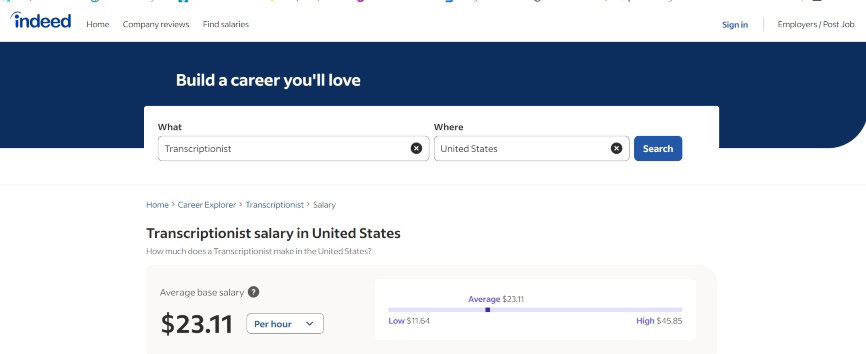Can you type with the speed of light? Then, consider learning how to become a transcriptionist and monetizing these skills of yours.
Nowadays, people worldwide look for suitable ways to boost their monthly income. Transcription can be the answer you’re looking for:
A transcriptionist is a freelance worker who earns money while picking their schedule and working hours. Such a remote job offers many advantages and a decent hourly pay rate.
Transcriptionists convert audio or video files into written documents – their completed projects must be accurate and error-free. Do you want to become one of them and start a well-paying side hustle for extra financial security?
Assuming you do, today’s article will be a valuable read worthy of a few minutes of your time. Let’s get to it, shall we?
This post contains affiliate links – read my affiliate disclaimer for further info.
How To Become A Transcriptionist With No Experience
What Does A Transcriptionist Do?

Quite frankly, transcription works easier than most people think. It’s a work-at-home job that requires converting video or audio files into written documents.
So, what does a transcription do? A transcriptionist listens to audio/video recordings and writes down everything they hear.
Typically, transcriptionists work on recorded content or live human speech. All legal transcription jobs provide earning opportunities in many different fields.
Previously, transcriptionists had to be in a physical office – that is no longer the case. These days, any transcriptionist can provide high-quality work from home and secure a well-paying online job with a flexible schedule.
Who Hires Transcriptionists?
- Large, medium, and small businesses who need a transcriber at their work meetings and discussions
- Video content creators (YouTubers, podcasters) willing to pay for transcripts of episodes
- Law corporations and other legal firms
- Marketers who need transcribers to work on focus groups and product-testing results
Transcription Areas You Can Specialize In
The transcription field has different areas in which you can specialize. Shall we look at them?
1) General Transcriptionist
General transcriptionists provide their services in almost all industries (except in the medical and legal fields). Allow me to elaborate on that:
A general transcriptionist can work on various video or audio recordings, such as interviews, speeches, focus groups, business meetings, podcast interviews, etc.
Additionally, general transcribers can book real-time captioning/closed captioning gigs and television broadcasting jobs.
2) Legal Transcriptionist
Unfortunately, you can’t secure legal transcriptionist jobs without obtaining a license or certificate. Once you do that, you can provide legal transcripts for depositions, court proceedings, and other legal recordings.
Who hires legal transcribers? That would be firms, departments, government agencies, and any law enforcement field that needs transcriptionists for witness statements, 911 calls, and other legal proceedings.
While legal transcriptionists often work in courtrooms or offices, they can also make money in the legal industry from their homes.
3) Medical Transcriptionist
What do medical transcriptionists do? They provide different transcription work (transcribing medical reports or patient histories) for clinics, hospitals, and other establishments in the medical field.
As you can guess, you can’t do such a job without being familiar with medical terminology. Each medical transcriber must get the necessary license or certification to book medical transcriptionist jobs.
Expect to work in a medical office – a certified medical transcriptionist can also work online.
Necessary Skills & Equipment To Get Started As A Transcriptionist
Medical professionals won’t hire you unless they see you as one of the top healthcare documentation specialists. Law firms will not offer you a job unless you know your way around legal terminology.
But what skills do you need to become a freelance transcriptionist (in any field) without previous experience? Have a look at the abilities you must develop before booking your first job in the transcription field:
1) Fast Typing Skills
Do you know what’s the first thing to remember while researching how to become a transcriptionist? The faster you type, the more money you can make.
In other words, your typing speed will directly affect your income as a professional transcriptionist. Sixty-five words per minute is good, but delivering up to ninety is even better.
2) Great English Skills
By all means, you can’t become a successful transcriptionist without in-depth knowledge and expertise in English. Knowing different languages is great, but it won’t serve you when getting your foot into the transcription industry:
Each written document you work on must be grammar, spelling, and punctuation error-free. An impressive knowledge of the English language is an inseparable part of the skill set you must possess.
3) Time Management Skills
Managing your time well is equally important as accurate typing when discussing essential transcription skills. Why is that?
No reputable transcription company will keep working with you unless you can deliver on time. More importantly, establishing yourself as a reliable transcriber is the best way to secure higher-paying work.
4) Patience & Concentration Skills
Let’s face it – transcribing audio or video files for hours can become monotonous quickly. After all, the transcription process is not the most exciting way to make money online.
Besides, you’ll have to deal with low-quality files sometimes – will the background noise affect your ability to do this line of work?
Hopefully, you have enough patience, considering good concentration will improve your chances of attracting many potential clients in various industries in the transcription field.
5) Transcription Equipment
- Computer/Laptop
- Fast internet connection
- Word processor (Microsoft Word or Open Office)
- Foot pedal
- Professional headset
- Transcription software
Since my take on how to become a transcriptionist aims to help beginners, I should mention a couple of facts about the equipment:
Above all, the exact equipment you need to build a lucrative transcribing career depends on the type of transcription work you want.
For instance, if you choose to work for a transcription platform, a laptop and fast internet are enough to get you started.
However, you should invest in all the items above to earn a living as a transcriptionist in the long term.
How Much Money Do Transcriptionists Make?

According to Indeed, the average transcriptionist’s salary in the United States is $23 an hour. Of course, beginners with little (or no) prior experience earn less than that ($11 an hour).
The precise amount you can make working as an independent contractor depends on your niche, experience, typing speed, and available working hours.
General transcriptionists can earn up to $50,000 annually. Meanwhile, legal transcriptions earn over $60,000.
Medical transcribers get up to $80,000 a year. Here is everything you must know about these numbers:
Typically, a transcriptionist gets paid per audio/video minute or hour. As a result, the faster you provide accurate transcription, the more money you can make.
Additionally, some transcription companies pay per project instead of per hour – ensure you’re familiar with such details before committing to a transcription gig.
Available Transcription Training And Certifications
First and foremost, a high school diploma is enough when looking for general transcription jobs – you don’t have to research local community colleges to learn how to become a transcriptionist.
Be that as it may, getting a formal education will serve you well before joining the transcription industry. Signing up for online courses or other educational programs will polish your skillset faster and ensure better-paying transcribing positions.
You can’t transcribe for healthcare professionals or work with medical records before completing the necessary training. Future medical transcriptionists should look into organizations like the Registered Healthcare Documentation Specialist.
That program offers in-depth training any healthcare provider hiring transcribers will appreciate. Visiting Healthcare Documentation Integrity is a must as well, in my opinion.
An alternative way to obtain a transcription certification is via the American Association Of Electronic Reporters. What about the legal transcriptionists?
They should get certified at the National Court Report Association – I can’t think of a better place to help you become a court reporter.
How To Become A Transcriptionist Online
1) Choose A Transcription Type And Niche
As you can probably guess, the first step to becoming a transcriptionist is choosing a niche and transcription type. How should you do that as a new transcriptionist?
Firstly, think about what interests you and the hobbies you like to do. Most newbie transcribers start in the general niche, but you can get into the medical or legal one if the prospect excites you.
Secondly, do the hard work necessary to become familiar with your chosen transcription niche – learn the terminology, test the transcription software, and practice your skills by listening to podcast episodes, live events, etc.
Lastly, decide whether you want to offer transcription services part-time or full-time. Option one is a great way to earn extra money, while option two will allow you to make a living from home while working on your own hours.
2) Improve Your Transcription Skills
Whether you go after general transcription jobs or join medical transcription programs, having a good ear is not enough. It would help if you also type fast.
All in-demand transcribers have one thing in common – they can type faster than most workers in the field. So, how do you reach the same level as them?
Different ways exist to get there. Shall we look at some of them?
You can use free online tools to check your typing speed while practicing. An alternative solution is joining transcription companies like GoTranscript:
GoTranscript offers many resources to its transcribers to help them become better at the job. Feel free to learn more about it from my GoTranscript review.
3) Create A Professional Resume And Apply For Transcription Jobs
Is your skill level good enough already? Are your transcription abilities impressive at this point?
Assuming they are, building a professional transcription resume is the next step to take. Don’t hesitate to update it when you gain a new skill or experience.
Where do you find available transcription positions? By all means, start looking for those through platforms like FlexJobs.
4) Make More Money As An Experienced Transcriptionist
Generally, the better you are at any work-at-home job, the more money you can make. Transcription is not an exception to that rule:
Your skills will constantly improve if you practice them relentlessly.
Professional, accurate, and faster transcription abilities will allow you to apply for higher-paying jobs. And where might you find them?
Fiverr is a global marketplace freelancers use to offer different services, including transcription. Creating a Fiverr account will allow you to pick your pay rate and working hours as a transcriber.
Upwork works similarly – that platform is the perfect place to pitch your transcription services and choose an hourly pay rate.
Where Can I Find Transcription Jobs?
Once you complete your formal training or a certification program, you can start looking for transcription jobs for beginners. Is there enough of those?
You bet there is – human transcriptionists will always be in demand. Even though AI (Artificial Intelligence) is everywhere now, it can’t replace people as workers fueling the transcription field.
Here are your best options to earn an extra income as a first-time transcriber:
Daily Transcription
Daily Transcription is an excellent transcription company to join as a newbie transcriptionist. It offers jobs in many fields, including legal, corporate, and academic transcription.
Working for Daily Transcription will be possible if you type at least 50 words per minute and pass a transcription test. Most experienced transcribers earn over $900 weekly – you won’t make that much from the beginning.
Speechpad
By all means, Speechpad is probably the best place to start your transcriber’s career. Speechpad offers free qualification tests you can complete to get previously unreachable jobs.
Most entry-level jobs pay $15 per audio hour, but you can find projects that will earn you $60. Expect your earnings weekly via PayPal.
TranscribeMe
Since you now know how to become a transcriptionist, let me show you the most suitable place to get your first job – TranscribeMe. Passing an English test is all you have to do to join the company as a transcriber.
Newbies receive short audio and video files to transcribe – you’ll gain access to longer projects later. TranscribeMe pays $15-$22 per audio hour.
CrowdSurf
CrowdSurf offers low pay rates since most beginner transcribers make around $10 an hour. However, this transcription company will allow you to earn per second:
Many of the available transcription clips last less than a minute. So, CrowdSurf suits anyone looking to make extra cash in their spare time.
Rev
Nowadays, Rev is probably the most popular company newbies or experienced transcribers can join. Joining Rev to get paid as a transcriptionist is simple:
Freelance transcribers must complete a quiz and a sample transcription. Each audio minute will bring you $0.30-$1.00.
How To Become A Transcriptionist FAQs
How Long Does It Take To Become A Transciber?
Generally, becoming a transcriptionist can happen fast once you have the necessary skills and certifications (for legal and medical transcription).
A transcription course might take months to complete. Learning to work with transcription software requires time as well.
Some transcription companies might hire you immediately and allow you to develop your skills further while working on paying projects.
What Qualifications Do You Need To Be A Transcriber?
You don’t need qualifications to work in the general transcription field. However, you must obtain the necessary certifications to work in the legal or medical transcription industry.
Going after jobs in these fields entails knowledge of legal terms and medical terminology.
How Do I Start To Become A Transcriptionist?
How To Become A Transcriptionist With No Experience:
- Pick A Niche: Each future transcriber must choose a field, such as general, medical, or legal. Select a transcribing niche that suits your interests and personality.
- Enhance Your Skills: Fast typing and accuracy are essential skills for any transcriptionist. Practice these abilities to improve them as much as you can before applying for your first transcription gig.
- Get The Necessary Tools And Equipment: Typically, any transcriptionist needs a laptop, transcription software, a word processor, a foot pedal, and a headset.
- Go Through A Training: Future transcribers will benefit from completing an online course or certification program. Working as a medical or legal transcriptionist can’t happen without the necessary qualifications and certifications.
- Find Transcription Jobs: Many transcription platforms hire beginners, including Rev, TranscribeMe, and GoTranscript.
How Much Do Transcribers Make?
Nowadays, transcriptionist salaries depend on your chosen field, the hours you’re willing to commit, and how fast you can type. Beginner transcribers earn around $11 per audio hour.
Once you gain enough experience and improve your transcription skills, you can make up to $75,000 annually.
My Closing
Is everything clear about how to become a transcriptionist? Hopefully, it is:
As you can see from the content above, becoming a transcriber is not that complicated. Follow the steps, constantly improve your skills, and start making money once you’re ready to transcribe.
What questions do you have on this topic? Do you want to ask me anything about earning an income as a transcriptionist?
My comment section will welcome all your thoughts and opinions!
Other Exciting Ways To Earn Money
- How To Become A Freelance Writer
- Start Working As A Social Media Manager
- Step-By-Step Guide To Becoming A Virtual Assistant
- The Definitive Guide To Becoming A Proofreader
- Do You Want To Become A Scopist?
- 17 Typing Jobs That Pay $20 an Hour
- 37 Jobs That Offer $40 an Hour
- 50 Best Weekend Jobs
- 44 Online Jobs That Will Pay You Per Week
- 20 Online Jobs Paying Daily
- Top Ways To Make Money From Home
